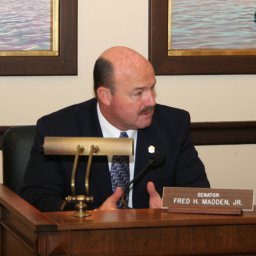
TRENTON – Legislation sponsored by Senator Fred Madden and Senator Jim Beach to limit access to data from event data recorders, devices in certain automobiles that can capture information about the driver’s activity, was signed into law yesterday.
“While new vehicles are being equipped with event data recorders, it is important that we regulate the retrieval of data to protect drivers.” said Senator Madden (D-Camden/Gloucester). “These devices are key to determining the events that took place during an auto accident. Yet, to date, there are no restrictions concerning who can access the data and for what purposes. This law will ensure that the retrieval and usage of event data recorders on vehicles are utilized appropriately and for the right reasons.”
The law (S-2433/A-3579) will give the owner of a motor vehicle the sole right to access information stored in its black box, also known as an “electronic control module” (ECM) or an “event data recorder” (EDR). Such devices are capable of recording information about vehicle speed, seatbelt use, airbag deployment and locations traveled. The law also includes a provision prohibiting data from being altered or deleted for at least two years after a crash that results in bodily injury or death. Violation of the provision would result in a civil penalty of $5,000 for each offense.
“Black boxes are essential to piecing together the factors that cause auto accidents on our roads and highways,” said Senator Beach (D-Camden). “With recordings, we can determine the speed, braking, airbag deployment, and other critical information that can help investigators paint on overall picture of a car crash. However, the protection of our resident’s personal information is just as important. Through this law we will better ensure the privacy of drivers by establishing set guidelines of who can extract and utilize data on these devices.”
Under the law, no person except the owner of the motor vehicle that contains the recording device, or the owner’s representative, may retrieve, obtain or use data recorded on, stored in or transmitted from the recording device, unless:
· the owner or the owner’s representative consents;
· the recorded data is retrieved or obtained by a law enforcement officer pursuant to a search warrant;
· the recorded data is used for the purpose of improving motor vehicle safety, provided that the identity of the owner, operator or other occupant of the motor vehicle is not disclosed with respect to the data;
· the recorded data is retrieved by a licensed motor vehicle dealer, repair or servicing facility and used for the sole purpose of diagnosing, servicing or repairing the vehicle, or;
· the recorded data is accessed by an emergency responder and used for the sole purpose of determining the need for or facilitating an emergency medical response in the event of a crash, and assisting the responder in performing his or her duties; or
· the recorded data is retrieved or obtained pursuant to a legally proper discovery request or order in a civil action, or is obtained pursuant to a grand jury subpoena. This however, would exclude video location data obtained through grand jury subpoena.
The law will also allow a vehicle owner to consent to give a third party access to information contained on the device.
“Black boxes” are common among new vehicles. In 2012 the National Transportation Safety Agency proposed that all new vehicles manufactured after September 2014 contain “black boxes.” There are currently no regulations concerning who has access to the data in motor vehicle black boxes and for what purposes.
The Senate approved the law by a vote of 39-0. The Assembly approved it with a vote of 73-0. It takes effect immediately.


